This War is about Democracy
Living in Russian glubinka is so horrible they use it as a punishment
Missed me? I apologize for the long silence, but I have really no excuse.
I just found the whole endeavor repetitive an futile. We live in the disinformation age and the truth lost.
What’s the point of reporting the facts, when Elon Musk or Russell Brand post some obvious BS and reach millions? If you try to correct them, you inevitably have to repeat the same facts again - being repetitive, and therefore boring.
This note will also be repetitive. It is essentially a follow-up to “Living in Russia is Hell”, which I wrote over a year ago.
That one was inspired by a series of recruitment ads targeted at Russian audiences. Their message boiled down to “your civilian life is hell anyway, so why not volunteer for the army, what do you have to lose?”.
Back in a day, this caused some uproar among the Russian bloggers that I follow. They considered these ads “anti Russian”. Maybe so, but they did the trick: so far Putin indeed is able to find volunteers to die for him, apparently they REALLY have nothing to lose.
The mock image of a new high speed train that is supposed to connect Moscow and St Petersburg in some unspecified future (as we say, it will be probably just to celebrate the holiday of St Never) - via TG Channel Tolkovatel
Recently at the Petersburg Economy Forum it was announced that a new, modern high speed rail will connect Moscow and Petersburg, via Tver and Novgorod. The discussion went off topic, as usual in the social media, but the new direction was a surprise even for me.
Russian bloggers began to wonder why Tver and Novgorod are such shitholes, if they are located between two prosperous cities. “Very good question!”, admits Roman Saponkov (I actually quote him also in “Living in Russia is Hell”) and he adds his three kopeykas to the discussion.
“Good question!” by Roman Saponkov (via his TG channel)
“When I travel to Europe I’m always surprised how well they live in glubinka” - he writes. I leave this word without translation, because I don’t think there is a good equivalent in Western languages.
“Glubinka” means literally “deep territory”, but the literal meaning can be misleading. In this discussion Tver and Novgorod are classified as “glubinka”, although they are literally in the middle of the Moscow-Petersburg urban corridor.
In other languages and cultures you do have some expression for “flyover states” or “one horse town”, but in Russia, “glubinka” could also mean a city with population over a million. Basically, everything that isn’t Moscow or Petersburg counts as “glubinka”.
Living in “glubinka” is so unpleasant it was used as a punishment in the Soviet and tzarist years. Andrei Sakharov, the famous dissident, was internally exiled to Nizny Novgorod (of population 1.6 million), until Gorbachev “pardoned him” and allowed him to return to Moscow.
Saponkov seems genuinely surprised that this is not the case with the Western equivalents of “glubinka”. In Finland he noticed that a small town can be beautiful “like on a postcard”. And he specifies what he means by “postcard quality”: beautiful houses, pedestrian-only streets, summer garden cafes, a lake in the city center with a paved sidewalk, where people are strolling...
And the climate is exactly the same like in Russian Karelia - he notices. So why can't cities in Russian Karelia look as nice as those in Finland? A very good question, indeed.
He asks further: “Why an hour of ride outside Moscow or Petersburg takes you to a city that looks like set decorations for <<Cargo 200>> [a post-Soviet thriller that made the expression world famous - ES]? Even if there is a lake in the center, it’s overgrown with reed, and instead of a sidewalk there is a dead Soviet factory?”.
The actual “Cargo 200” (directed by Aleksei Balabanov)
Since this discussion originated at the economic forum, some economically-minded bloggers already provided their economic answers. Moscow and Petersburg are important hubs for business and administration and they siphon off resources from Tver and Novgorod. People from Tver and Novgorod find better jobs in one of the two Russian capitals, relocate there and pay taxes there. So nothing can be done about it.
Saponkov agrees but he asks another question. How do they manage to avoid this problem in Europe, then?
He provides his answer: perhaps the state should forcibly relocate some companies from Moscow and Petersburg to glubinka. And perhaps companies in the capital cities should be more heavily taxed?
How do they do in in Europe - Saponkov wonders (via his TG channel)
Well, comrades - how do we do it in Europe? Small towns in Poland often have the same “postcard quality” as described by Saponkov - even down to the lakeshore promenade.
I like reading Russians, because it kind of forces me to rethink my own values. In Poland, it’s not usual to say out loud “I like democracy”, one is socially expected to complain about it.
But in reality the main answer to the “postcard questions” is that there is a mayor, there is city council, they want to get reelected and one of their dirty tricks is making the residents happy (even if they refuse to admit it).
In Poland the local authorities usually keep getting reelected. We have an expression about our “unsinkable” mayors and presidents. Some of them are literally holding the office since the first free election in 1990!
The “unsinkables” phenomenon is frequently cited as a flaw in Polish democracy, but I would argue otherwise. People vote for them because they are more or less satisfied.
Of course, any self respecting Polish citizen will present you with a laundry list of issues with their mayor/president. In fact, it could be a good detector for foreign spies: if someone is in awe at the postcard-quality landscape, it’s probably a Russian spy.
But the fact remains that many Polish cities evolved from what Romanov describes as the typical landscape of Russian glubinka (“decaying factory ruins by an overgrown lake”), to the European Union “postcard quality” standard. Pedestrian-only streets? Check. Cafes with summer gardens? Check. River/lakeside promenade? Check.
It’s largely because of the effort of local authorities. There are European funds designated specifically to improve “glubinka”, but they don’t work on their own, the local authority must present a project and win the approval to get the funding. The failure can sink the “unsinkables”.
That’s what I mean when I say that Ukraine fights for democracy. I can see your cynical smiles from here!
Yes, I know Chomsky, I know Breitbart and I know that there is no real democracy in the West. When a political candidate can’t even pay hush money for a porn star from his campaign funds, that’s basically Gestapo! I read that one too.
But I don’t use here “Democracy” as some unattainable perfect Platonic ideal. I mean it in the very basic, technical way: that your local president/mayor needs your vote to keep their post.
Saponkov solution to the “glubinka” problem is very typically putinist. If the problem with Tver comes from the fact that people from Tver moved to Moscow for better jobs, let’s just forcibly exile them back to Tver, make them pay taxes there, and problem solved!
Somehow I don’t think this solution would result in “people happily strolling on a lakeshore promenade” and “summer garden cafes full of local residents”. And what about pedestrian-only streets?
Well, on November 14th, 2018 the city of Tver disbanded its tram network citing that decades of neglect damaged it beyond repair. So if you don’t have a car, comrade… vam pizdets, pardon my Russian.
Russian glubinka - Pereslavl-Zalesskiy, phot. by Igor Zhirnov, via FB fanpage “Estetika Yebenya”
If Gods hate you and they made you live in Russian glubinka, there’s little you can do. You can’t vote out the people who mismanage your city. You can’t even complain - people who complain about the authorities in Russia are prone to lethal accidents. You might as well join the army and die in another meat assault.
People in the West who don’t speak Russian often fall for the propaganda aimed specifically at the clueless Westerners. Social media are full of fake images of the beauty of Russian towns, propagated by people pretending to be Russian, such as the infamous Donbas Devushka. Thus some people in the West may think that maybe Putin is harsh, but at least he keeps the streets clean and the trams running on time.
But it also works the other way round. Those Russians who never travel to the West actually imagine our “glubinka” as something more or less similar to theirs. If you show them photos of the quality of life or average people in some average European town, they will think it’s all staged. And even if someone like Saponkov happens to visit such town, he still does not get how it actually works, his understanding of Finnish society is on the cargo cult level.
This misunderstanding leads to people on both sides asking the same silly question: what’s the point of resisting, why die for the flag on the city hall? Because this never merely about the flag.




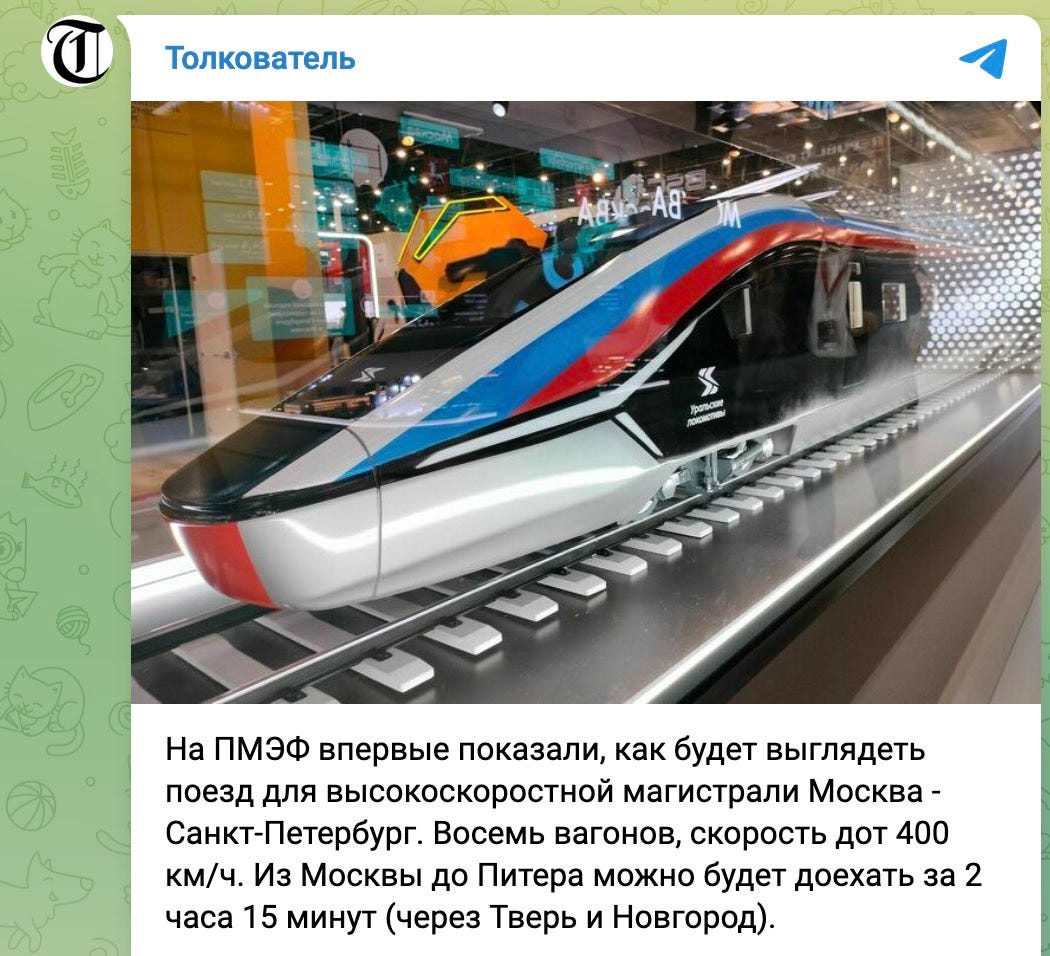
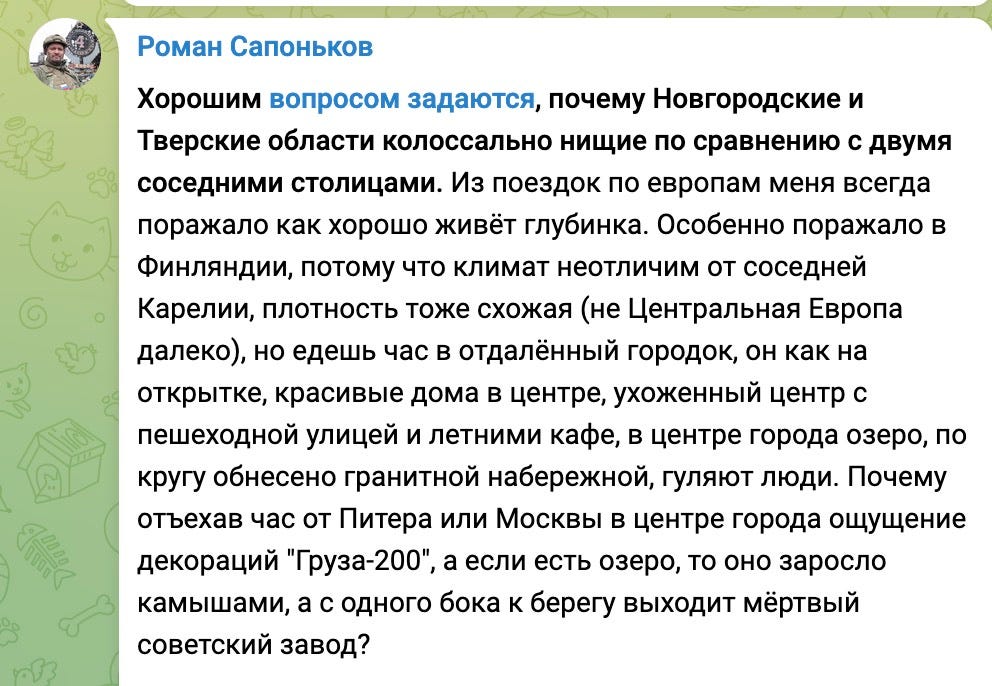
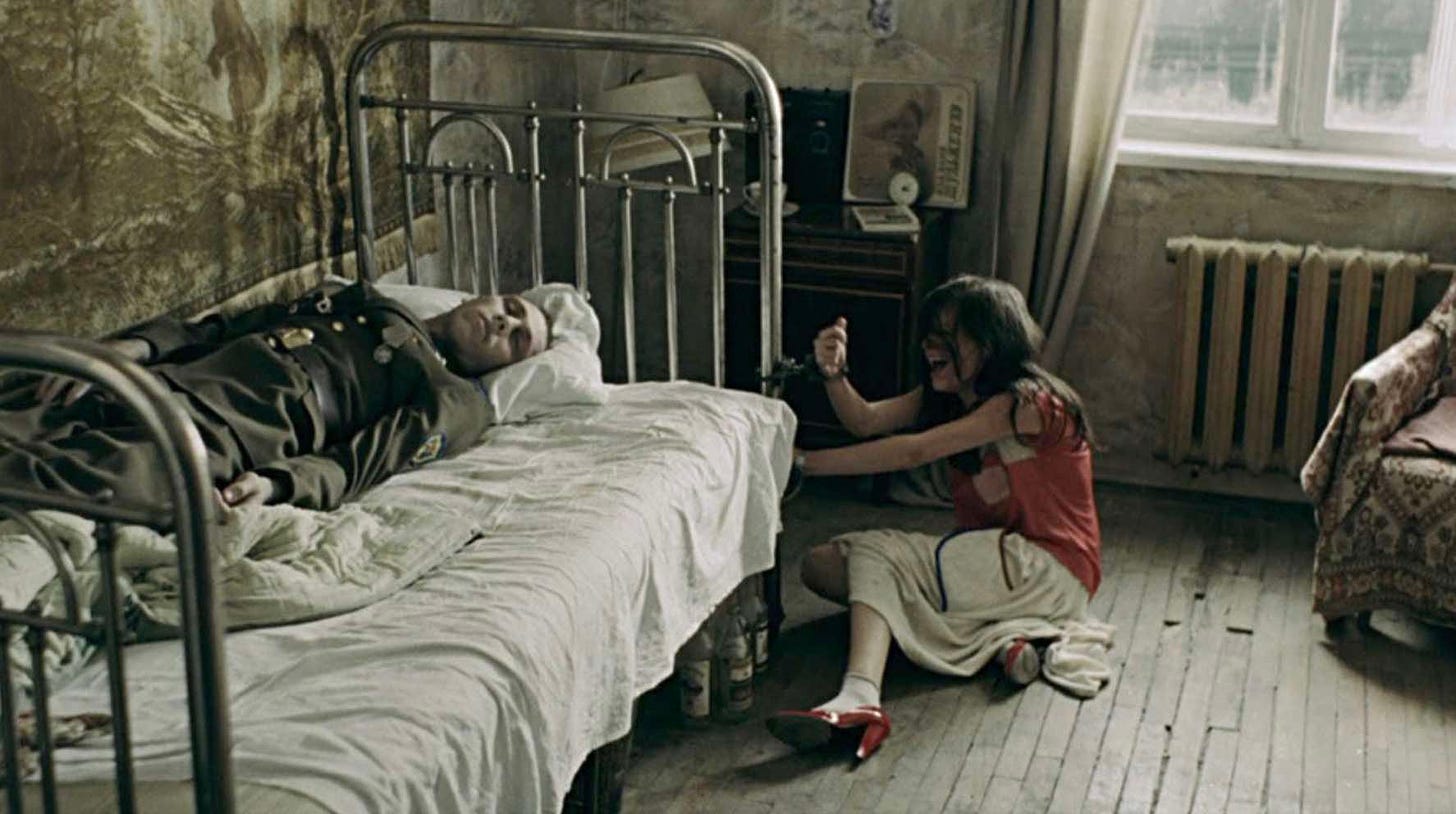
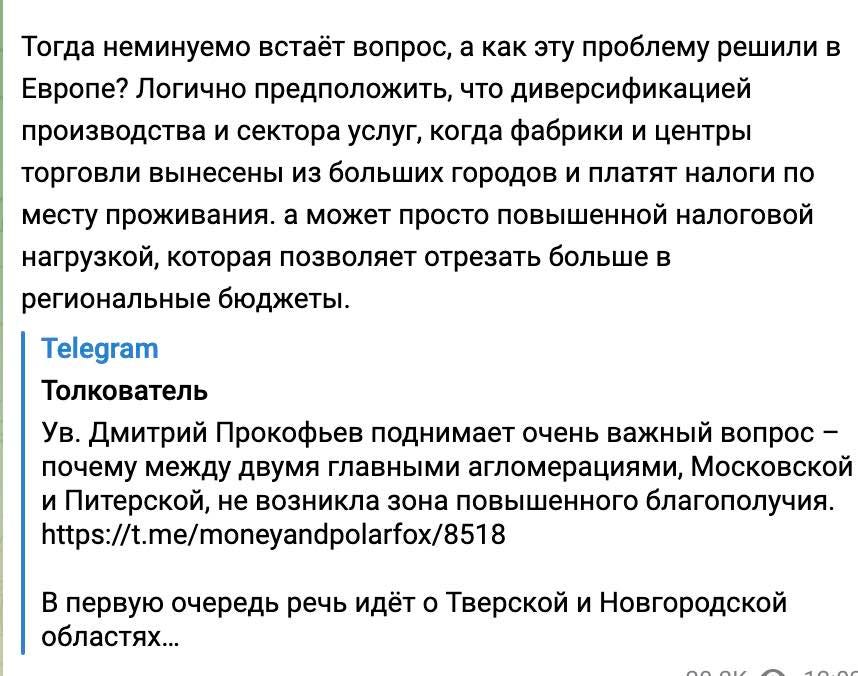
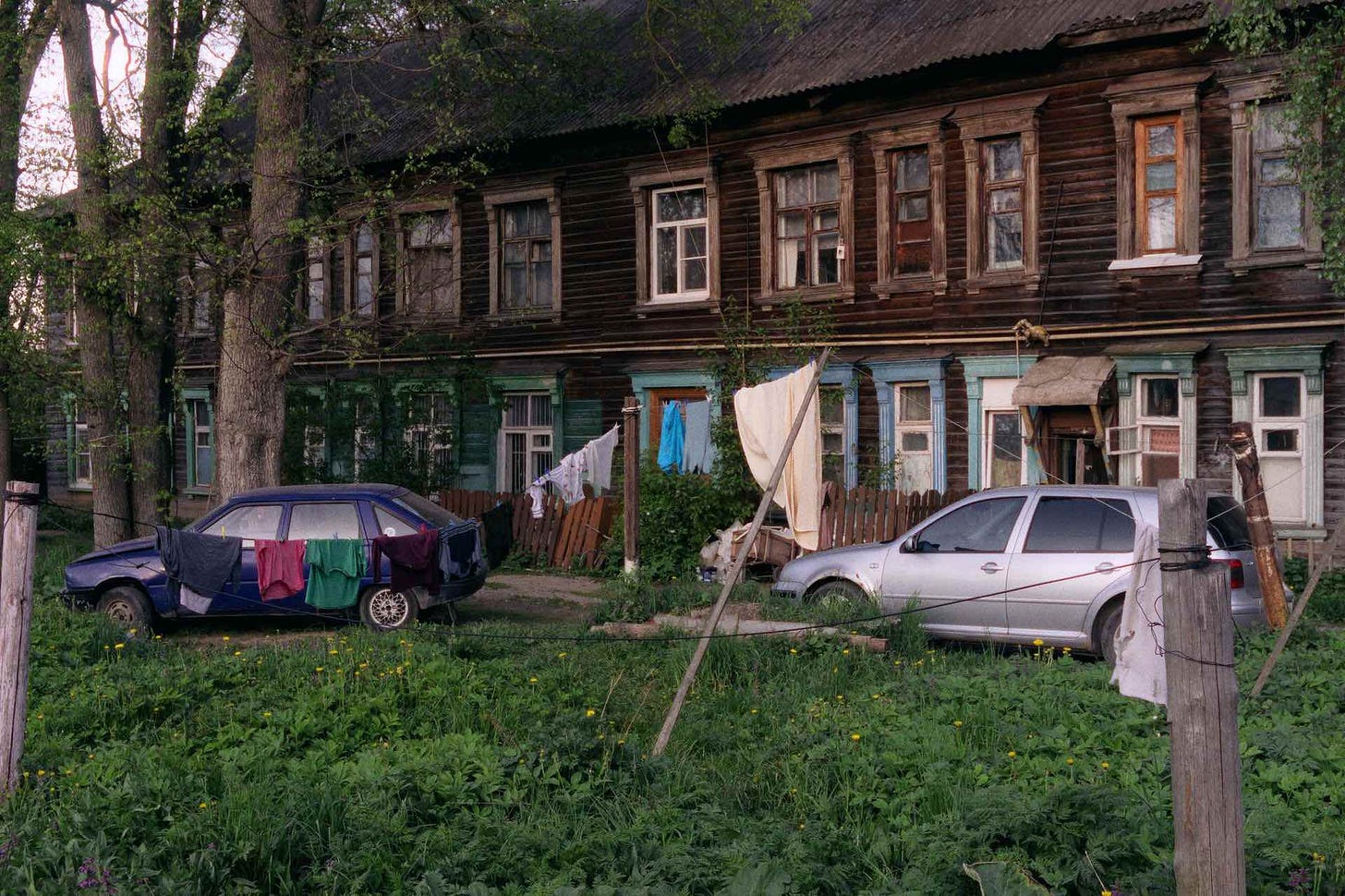
For example, it's about getting your children back: https://www.ft.com/content/2d0013d2-a407-449f-b1e2-3d14fe65188f
The glubinka/metropoly difference is interesting, because -I'm guessing- Russians may think the same way about relations between countries. There has to a "metropolis" (like Russia or USA) that sucks resources out of glubinka nations (like Ukraine or western Europe), so why do these weird eastern Europeans want to move their glubinka to the US glubinka? And many westerners buy into the same thinking, unfortunately.